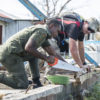By Ms E. Frith
“25% of New Zealanders have poor mental wellbeing, with under 35s being more at risk of mental illness[1].” Current serving members (and veterans) of the armed forces are no less at risk of poor mental wellbeing or mental illness. A mental health survey of the NZDF in 2016 highlighted that 23% of those serving had elevated distress that could lead to long term implications and 10% of those serving had symptoms of stress disorders[2]. The stigma surrounding mental health and the fear of disclosure holds people back from asking for help. What can we do as an organisation to generate conversation and support those who need it? This piece will look into barriers to asking for help and current mental health paralines within Joint Support Group (JSG).
The New Zealand Army provides a range of mental health tools for its personnel, such as mental health pocketbooks, the mental health continuum or 0800 NZDF 4 U. Once people feel they are able to reach out, there are multiple resources they can do this through; the Padre, Medical Officers, Nurses, Psychologists and Social workers. The issue is not a lack of resources or external aid, it comes down to the internal dialogue of the sufferer. A person suffering from a mental illness can find it hard to reach out for a number of reasons; they don’t know who to approach or what to say, they don’t want to be seen as different and their internal dialogue is telling them that they will a burden to others, which increases their guilt.
Enlisted pers (current or veterans) will experience similar feelings or a combination, but may also face the added barrier of the ‘uniform’. By telling a Pysch or Medical officer, they have reached out to a resource connected to the organisation and as such they face a new unknown. They wonder what discrimination they will face at work. And how this will impact their career and its progression[3]? This can be an influential fear for sufferers and their internal dialogue will be telling them to stay quiet so as not to incur repercussions. A relapse of this thinking can also occur once the sufferer has reached out and they then ‘regret’ making that decision, which can lead to them withholding information or shielding their true thoughts. Removing the ‘uniform’ barrier is not an easy task but it isn’t impossible. Working to make the unknown known will create a transparency that can generate trust and reduce the stigma of mental health. What can be done?
An option is to increase the capacity of civilian nurses within the Defence Health Centres. Increasing the accessibility to nurses allows enlisted pers the chance to communicate with someone ‘outside’ of the uniform who has no connection to it, the nurse cannot influence decisions made by command. Talking to a civilian nurse gives the sufferer a chance to communicate their experiences and their feelings without fear of facing perceived discrimination or external implications. Communication in a civilian context can allow the sufferer the chance, and ability, to organise their thoughts and have a clear idea of how to explain their experiences and how they want to best move forward. A triage based system should be developed to aid with determining the appropriate level of care that is required for the sufferer. Working as a clinical triage system, the sufferer is assessed by a mental health nurse or civilian nurse who then decides what resource would be able to support them best, such as the Padre or Psychologist. The risk of personnel not accessing the level of care they require at the beginning of treatment is that their mental illness can progress further, becoming more complex and leading to the requirement of more invasive treatments. Creating a clinical team of the civilian nurse and either a Padre, Psychologist, Medical officer or a mix will be the best way to support the sufferer moving forward. The clinical team can aid the sufferer in communicating with their chain of command and implementing the best plan of care. Moving forward through mental illness is an incremental process. It doesn’t need to be and shouldn’t be rushed.
The Joint Support Group (JSG) sits within the New Zealand Defence Force and is a tri-service health component. JSG looks after the elements that comprises force health and deployable health, consisting of a number of different paralines. Of these paralines, three are noticeably unfilled; Mental Health Nurse Northern Force Health Organisation, Mental Health Nurse Central Force Health Organisation and Mental Health Nurse Southern Force Health Organisation[4]. Filled, these mental health paralines could influence mental health stigma and treatment within the New Zealand Army. Mental health nurses have a different role from therapists. While both parties work with the individual to address mental health needs and concerns, nurses have an active role in creating a care/ safety plan and they are also able to provide medication advice and management[5].
Having a mental health nurse role filled within the Defence Health Centres could help to normalise the treatment of mental health within the Defence Force because the roles will be a part of the ‘normal functioning’ Defence Health Centre. Currently, those with mental health illnesses get referred to clinical therapists often located outside of the camp, this can be invasive as the sufferer has to provide reason to their command as to why they are leaving camp. If there were mental health nurses at the Defence Health Centres than the sufferer would be able to stay at camp and would need less time away from camp for their appointment, meaning their absence is less noticeable from others. This is especially important in our isolated camps such as Waiouru. Clinical referrals in Waiouru have to go to Palmerston North, this requires the sufferer to take leave which draws attention from their chain of command, requiring the sufferer to provide reason. Providing a clinical psychologist and mental health nurse 2-3 times a week through the Defence Health Centre, allows the sufferer to receive specialist treatment without drawing attention. Being able to see a mental health nurse may be less confronting for a sufferer than having to see a Medical Officer, again due to the perceived implications of seeing the Medical Officer. Mental health nurses can play a vital role in how the New Zealand Army moves forward to help those with mental health illnesses and how mental health is perceived.
“Mental health is the foundation for well-being and effective functioning for an individual and their community[6].” Prevention of mental well- being deterioration is as important as providing care once a person is suffering mental illness. Mental health nurses will be able to provide that pre-emptive care which will aim to stop a mental illness from developing further before it becomes a problem, in the long term hopefully reducing the mental health statistics within the New Zealand Army due to sufferers being able to seek help early.
Mental health illnesses are an issue for the wider society not only the New Zealand Army or New Zealand Defence Force, but more can be done to be inclusive of those who suffer from mental illness or who have suffered poor mental well-being. The internal dialogue of those who suffer from mental illness needs to be influenced to change in order for them to be able to reach out and use the external resources available. Changing the current perception of mental health within the army by generating greater transparency and ‘normalcy’ can help to influence this required change. It is not a short term change but rather a long term commitment from the New Zealand Army and the New Zealand Defence Force.
Footnotes
- Mental Health Foundation, 2021, www.mentalhealth.org.nz
- Chief of the New Zealand Defence Force, mental health and the front line and from the centre.
- What happens if I ask for help? New Zealand Defence Force health.
- New Zealand Defence Force, JSG establishment WEF 1st May 2021
- Jamaica Harrell. What’s the difference between various mental health professionals.
- Herrman, Saxena and Moddie. Promoting mental health.
Resources
Mental health foundation. (2018). Mental health statistics. www. Mentalhealth.org.nz
Chief of the New Zealand Defence Force. (2018) Mental health at the front line and from the centre. Speech.
New Zealand Defence Force health. (2021). What happens if I ask for help?. Defence Intranet Launch Pad, Mental health.
Sergeant Rains.(2021) JSG establishment WEF 1st May 2021. Email correspondence.
Jamaica, Harrell. (2021) What’s the difference between various mental health professionals? Hope and healing centre and institute.
Helen, Herrman., S. Saxena., and R. Moddie. (2005) Promoting mental health: a report of the World Health organisation, department of mental health and substance abuse. World Health organisation.






